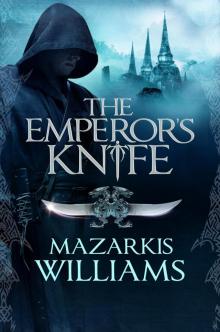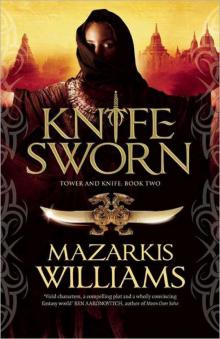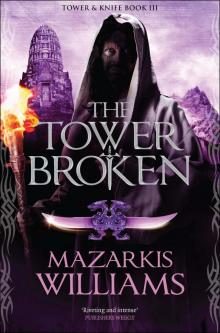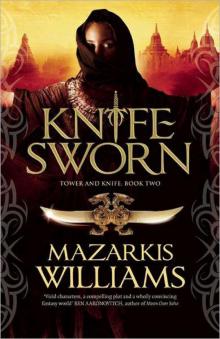- Home
- Mazarkis Williams
Knife Sworn tak-2
Knife Sworn tak-2 Read online
Knife Sworn
( Tower and knife - 2 )
Mazarkis Williams
Mazarkis Williams
Knife Sworn
PROLOGUE
Aldryth looked out over the sands of Cerana. There, hidden far beyond any well or waypost, waited the place where his god had died.
He sat upon a rock and pulled from his sack a crust of hard bread and an apple. He worked the crust in his mouth, sipping from a water pouch to soften it. He had come through the high passes of Mythyck and across the jagged beaches that no empire wished to claim but which claimed for themselves innumerable ships, leaving them battered and broken upon the shore. From there he had made his way through Parigol Pass, the last and loneliest place on the map to bear a name, bent against the howling wind, until at last he stood on the edge of the great desert.
Now he looked out over the vast emptiness and took a last mouthful of water before sealing the skin tight. Already sand scoured his tongue and gritted against his teeth. He saw no animals, no plants, not even insects. Here the sounds of life grew quiet and careful listening was required.
The next day he reached the sands. He sheltered from the heat in the lee of a dune, but even in the shade it seared his eyes and he wasted water by splashing them. Though his throat was raw he chanted the promises of his faith: sacrifice and love.
That night he drew the pattern for water, calling for its essence, but none came.
After three days in the desert his pace slowed as each step between the simmering dunes became a challenge. His skin blistered and peeled. His lips cracked and bled. His legs were abraded by sand. And yet he moved inexorably towards the Scar.
By the seventh day the sun had burned away his thirst, his hunger and all hesitation. Memories of the waterfalls of Mythyck, the lush valleys, the green trees and tart fruits, had dried to thin impressions and crackled from him with his skin. By day the soles of his boots crumbled into the burning sand; at night he shivered, the heat a distant memory. He kept his mind focused on Mogyrk, but it was the Scar that pulled at him, not with its power, but with its silence.
One night-he could no longer remember how many it had been-he stumbled over something, a corner of a square, flat stone inscribed with criss-crossing lines: a pattern-piece. Time and wind had submerged all but that edge. Scuffing at the sand he found others, and more besides, forming a wide arc. He felt the hum of living things, though it became confused and frayed, there and not there: the unwinding sorrows of flower and fish, tree and scorpion. I’m close now. He settled into the sand. Just some rest first. Some rest…
Flowers, red and purple, sprouted from a nearby dune. Aldryth had little time to look at them before they unwound, showing him the roots of their colour, the roads inside them by which light and water travelled, the pollen that nestled within their soft petals. Then he saw nothing but their patterns, triangles and circles floating on the wind, and soon those too were undone, until the dune lay bare and white before him.
He moved away, wanting to sleep where dreams of the Scar would not disturb him, and yet they did: patterns dissolved and drifted away across the sand, here an autumn leaf, there a drop of honey, each gone pale, drifting apart. The wound torn by the god’s death was spreading, a fraying of the fabric of existence, an unravelling, expanding in all directions as if the god’s doom had been a stone cast in the pond of the world and only now were the ripples starting to show. Sometimes Aldryth saw only blackness, and then he trembled, convinced for a moment that a void was all that existed and life was no more than a fading memory.
He began to chant his devotions, but his parched mouth ached and he found he could no longer remember the tune, its rises and breaks, the picture it drew from notes and the spaces between them. He looked at his hand and saw it complete-muscle and bone, blood and sinew-but could not remember how to make the signs for any part of it. The Scar was spreading.
Aldryth felt it in the core of himself, the Unwinding, the essence of his life coming undone, not a peeling of skin or a breaking apart of bone, but a dissolving, the falling away of component pieces for which he could no longer find the words. Now he understood. Mortals were built upon many patterns but the god had only one: a single pattern stronger than the many, one pattern to cover the world. Mogyrk. He shaped the word with his tongue that was no longer a tongue, his undone lips and his throat that for the moment before it disappeared could have shouted to wake the entire desert: Mogyrk.
CHAPTER ONE
GRADA
Thrashing churned the water, white foam, tinged brown with river mud. Grada knelt on a broad stone bedded in the shoreline, her arms elbow deep, wringing as she had wrung out the robes of the wealthy many times before.
Muscle bunched across her shoulders. Jenna had always said she was strong. Ox-strong, head-strong.
Further out the river slid past, green-brown, placid. Somewhere a widderil called out its song of three notes with all its heart.
They had come from the thickness of the pomegranate grove, two of them sticky with sweat, laying down their pruning hooks as they saw her. Both of them old enough for wives, young enough for wickedness, stripped to loincloth and sandals, white-orange blossom from the second crop clinging to their chests and arms. The men had angled Grada’s way as she walked in the shade at the margins, where trees gave way to the river road.
“Hey, girl!” The taller of the two, both of them wiry with white teeth behind their grins.
Sometimes trouble sneaks up on you, but most of the time it comes waving a flag for any with eyes to see. Jenna, she’d never had the eyes the gods gave her, blinded by too much trust she’d been. Happy though. A friend to the world, right until the day it upped and killed her.
“Where are you off to?” The second man, trouble right behind him swinging that flag.
“I’ve business downriver,” Grada had said. She backed pace by pace towards the obelisk set to mark the orchard’s boundary, some temple slab brought in from the desert. Its shadow reached out to touch her shoulders.
“Have a pomegranate.” The first man gestured back into the greenery, so lush it looked wrong, like sickness.
Had she been the one to offer fruit they neither of them would take it from her, not from an Untouchable. But they would touch her.
“Come and help yourself.” His friend. “We’ve been plucking all day.” He savoured ‘plucking’.
She stepped deeper into the shadow, wondering why they would want her. They would have wives at home, babies perhaps, girls in the Maze who might very well take their lusts for a reed-net of pomegranates.
“Don’t play games now.” The shorter one, friendly entreaties gone from his eyes, leaving them hard. An old scar across his chest caught the sunlight, a thin white line.
Both came closer, taking turns to nibble away the distance, egging each other on. Don’t play games now.
Grada’s hands went to the belt that cinched her robe. A simple length of knotted rope, slipped through a loop at one end, the final knot larger and set through with a heavy ring of iron.
“I need to be on my way. I can’t stay.” But she didn’t leave, didn’t step away from the obelisk rising behind her; that would have been foolish.
“And we need you to stay.” They brought the perfume of the trees with them, sweet and heady. The man grinned, an ugly thing that dropped away as he moved into the shadow.
Jenna called her strong like the ox, but it wasn’t a man’s strength. She could outwork a man, out-endure one, but in the quick violence of a struggle the strength of men would tell against her. Grada pulled the rope from around her hips and her robes fell open. They had been white when she took them from Henma at the wash-stones; now they carried a week of road-dust.
&n
bsp; “Clever girl,” said the shorter man with the scarred chest. Girl, he said, though he hadn’t any years on her.
“I want to leave.” She knew herself no beauty, a broad face sculpted without delicacy, a solid frame. They wanted her because they enjoyed taking. Men like to take more often than they like to be given.
She should be scared. She wanted to know why she wasn’t scared. Just something else she had lost? Another part of her broken?
The tall man lunged, and she swung. The iron ring hit his cheekbone. Grada heard bone break. He staggered away, both hands clamped to his eye, howling. His friend watched her, amazed.
“Why did you do that?” He didn’t seem able to grasp it.
“Two against one isn’t fair,” she said, wondering as she spoke them if the words were hers, or something left behind, something dropped by the Many in the shadows of her mind. She looped the rope back into its place, watching the men. The tall one walked into a tree, staggered and sat down, blood leaking from under his hands. His friend didn’t seem to care, still wrestling with the injustice of it all.
“We were just playing.” He even seemed to believe it.
“You would have let me go when you’d finished?”
She turned, knowing it wasn’t over, and walked towards the river.
“Yes.”
A voice whispered that they would have buried her among the trees. Not a true voice, just an echo. Those hooks are meant for cutting. Another whisperer, one that sounded eager enough to cut. A keen edge must be used, sooner not later. Sharpness is a challenge.
Grada heard Scar-chest coming, feet pounding the hard-baked soil past the marker stone. Stupid. She had known he lacked the wit to creep. She had almost reached the point, the point beyond which he would have let her go, almost surprised herself. But he came, as she knew he would.
She ran too, skipping down the riverbank, barefoot, stone to stone. The look on his face-determination, eagerness, anger-all of it gone when she turned at the water’s edge and set her shoulder to receive him. He flew high as she took the impact and straightened, landing with a splash as wide as his surprise. Grada followed into the river and pulled her attacker into the shallows where she could drown him.
Thrashing churned the water, white foam, tinged brown with river mud. Grada knelt on a broad stone bedded in the shoreline, her arms elbow deep, wringing as she had wrung out the robes of the wealthy many times before.
And now, as the water calmed, as the thrashing of limbs surrendered to the cold and placid flow of the river, his face kept only a hint of surprise. She knelt on the rock, the river swirling cold about her arms, hands around his neck.
Somewhere in her, a tongue remembered pomegranate. Hers? Had she eaten one? Imagined the pale jewels inside to be riches that might take her from the Maze? Had that been her?
His eyes on hers, the water sliding between their faces, streaming his hair. This nameless man.
She had throttled chickens with more emotion, twisted their heads off and set the bodies still twitching in the basket, scaly legs still jerking as if to escape the hands that had plucked them from the yard.
Don’t play games now.
Grada stepped into the water and hauled him out, grunting with the effort. He lay half over her as she fell back onto the hot rock, a touch of the intimacy he’d been seeking. “Gods.” She sucked in a breath. Men became so heavy when the life ran out of them, as if it had buoyed them all their days. She lay gasping, then pushed him off, slapped his face, made him cough. The fear that had hidden away all that time in the orchard now crept back in, hunched in the pit of her stomach, putting a tremble in her hands that was about more than wet robes. She stood up.
“So I saved you.” She looked down at the man, black hair plastered to the rock. Had it been Grada that saved him? Once her choices had been hers, spread out like Kento sticks: pick one-they’re all yours, but pick one. Every choice felt like a step away now, each one leading to a different person. The Many had left her, but their paths remained, tracks worn in the empty lands, a thousand crossroads without sign or post.
And she walked on, water dripping to the dust, marking her trail like so many drops of blood.
To know that you are alone first you must know company.
Grada paced along the riverbank. In places the trail dipped as an irrigation channel crossed it, and in the soft mud the ruts and hoof-marks of the caravan could be seen among the countless camel-prints.
Grada knew what it was to be alone. For the longest time she had been alone and yet not known it, as if her life had been lived blind, until the Pattern Master gave her sight, until Sarmin showed her beauty. Now that sight had been taken. Now she knew she walked alone.
Along the river the air felt cool, though the sun beat down just as hard. At the oasis of Jedma the waters stretched so wide you couldn’t hurl a stone across them, but the air hung still and heavy, wrapped you in a warm, wet hand. The river breathed, though. The silence held a different quality.
Ahead, the faint smudge of smoke against the blueness of sky. Camel dung burned dirty when they gorged on the lush banks.
Grada found a place to sit beside the road. She didn’t need to creep up like boys playing hunt-the-cat, didn’t need to spy on her prey from some ridge or dune. They were there. The record of their passage, the smoke of their fires, told her so. Five dry dates made her lunch, fished from the deep pockets of her robe. She chewed them, savouring the old sweetness, slow and deliberate, like the camel thoughtful over its cud. The taste woke many memories, flavouring each so that it became hard to know which were hers.
“I’ll keep to the road.” She spoke to the portrait, a disc of obsidian cupped in the palm of her hand, Sarmin’s features incised into its surface. What the artist had found that would cut obsidian she didn’t know. “I’ll keep to my quarry.”
She had asked him for a statue, one of the icons the nobles had, to say their prayers to. The Old Mothers had them in gold and bronze: representations of Beyon standing six inches high in niches above their beds. Some kept them still, with just the name cut and re-stamped upon the base, Sarmin’s name below his brother’s image, a man too powerful in chest and arm to be Sarmin, though nothing like his brother either, so the emperor told her.
“I would feel silly giving such a thing to a friend,” he had told her. “You carry me inside you.”
Grada had carried him, now she carried the space where he had been. It seemed cruel to remind her and refuse her in the same breath, but then Sarmin, for all his cleverness, for all that he had shared her skin, did not truly know her. Perhaps he understood no woman, and maybe no man either. He had stepped from that room they raised him in, but she wondered if he would ever truly leave it.
In the end, Sarmin showed he knew a little more of her than he had admitted, for as she took her leave on the mission he assigned her, the emperor stepped from his throne, crouched beside her where she knelt prostrated and pressed the disk into her hand.
She twisted it now before her eyes. Straight on, you saw nothing, just a suggestion here or there. Only at an angle would the light catch on the artist’s cuts and offer up Sarmin’s features, caught in a few brief lines: as true an image as she had ever seen.
Grada slipped the disk back into her robes and stood, brushing away dust and grit. She walked on. The caravan would not halt long; they had kept a good pace for the past week.
Hours later, with the sun descending, she almost passed by the place where they had turned. She knew in other lands that tracking was an art-form, learned over a lifetime and practised with great skill. Cerana had few places where such skills mattered. Between the city and the sands lay only a thin strip of land where the ground would mark, and where the wind would leave such disturbance long enough to be of use. If the caravan had not numbered iron-shod horses among its steeds there would have been no choice but to follow closely and risk detection. Just one such print caught her eye, one half-moon, cut through the year-old flood-crust out towa
rds the fields. The caravan had left the river road, turned from the city with little more than a day’s travel ahead.
“I want to know about the slaves brought in from the north,” Sarmin had said to her. Not in the privacy of the room they once had shared, nor in the secrecy of that link-forged, then broken-that once had bound them, but in the light and space of the throne room. Only distance kept their words from the courtiers moving about the perimeter in a bright and glittering flow; only loyalty kept their secrets within the circle of muscled backs that Sarmin’s bodyguard presented to their emperor.
“Slaves have always come from the north,” she had said. Emperor, she thought, I should have called him, my Emperor. And slaves came from all directions, drawn into Nooria to serve, grow old, die. The roads north brought white slaves, down the river, too pale for fieldwork, exotic girls for the harem, for nobles wishing to show their sophistication, populating their houses with Mythyck’s children.
“I am told that they bear watching,” he had said. Who told him such things, she wondered.
“I will watch them.” She had fallen into her prostration. An Untouchable, the emptier of night-pots, washer of moon-blood from private linen, fallen in obeisance as if she were a man of property and breeding. Azeem had told her of the damage she did, of the poison that spread where she walked.
Grada turned away from the river, along the trail of hard mud beaten to dust, the wheat rising high to either side. A watcher left along the path would know her now, a spy, following along a trail to nowhere. Grada eyed the wheat, swaying in the wind’s half-breath. Best pray they had left no watcher.
A quarter mile along the trail and the wheat had halved in height, an arid taste on the air, irrigation ditches struggling to do their duty. Grada stopped. She wriggled her toes in the dust-sand as much as dust now.
Life at the bottom of a pecking order teaches you to listen and to watch. When any hand can and will be raised against you, it pays to know where those hands are. City sounds are not river sounds, and river sounds are not desert sounds, but a keen ear will learn the ways of each. Grada didn’t hear the approach, but she heard the hidden birds fall silent, the creakerbugs pause and each small thing grow quiet until only the wheat’s rustling remained.

 The Emperor's knife
The Emperor's knife Knife Sworn tak-2
Knife Sworn tak-2 Tower & Knife 03 - The Tower Broken
Tower & Knife 03 - The Tower Broken Knife Sworn
Knife Sworn